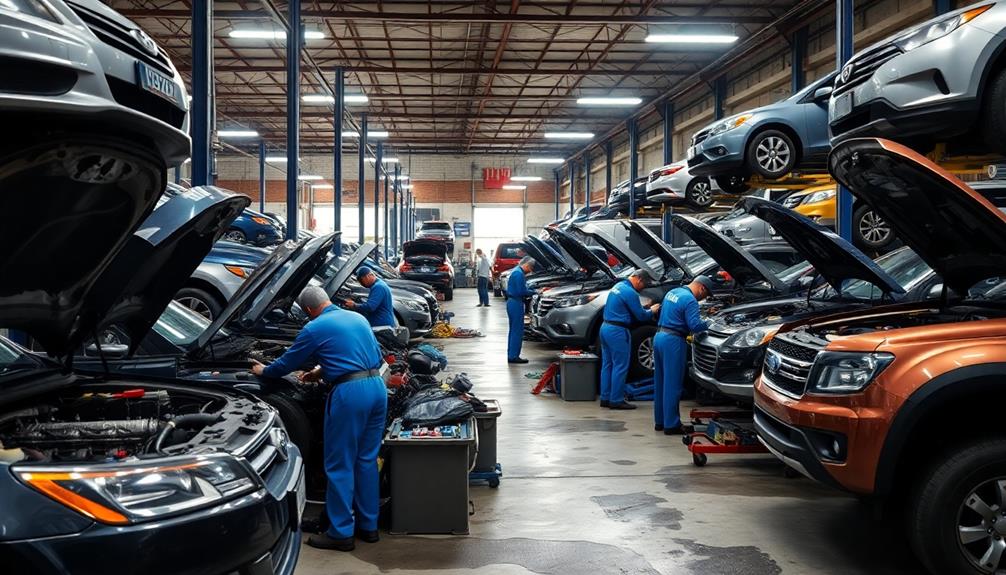An automotive repair shop is a facility where you can access various maintenance and repair services to keep your vehicle in top shape. These shops offer routine upkeep, like oil changes and tire rotations, as well as more complex repairs, including engine diagnostics and brake replacements. You'll find different types, such as independent shops, quick lube locations, and mobile mechanics that come to you. Each type specializes in unique services to cater to your needs. If you're curious about the specifics or want to know what services a particular shop offers, there's plenty more to explore. Many shops also provide additional specialized services such as alignment checks, air conditioning repairs, and electrical system diagnostics. When selecting a repair shop, it’s essential to understand how automotive repair in retail classification operates, as some facilities may be categorized differently based on the range of services or the parts they sell. This classification can impact pricing, warranty options, and the overall customer experience.
Key Takeaways
- An automotive repair shop specializes in maintaining and repairing vehicles, offering a range of services from routine maintenance to major repairs.
- Types of repair shops include independent shops, quick lube services, mobile mechanics, and specialized shops focusing on specific vehicle components.
- Common services offered include oil changes, engine diagnostics, brake replacement, and suspension repair to enhance vehicle safety and performance.
- Many repair shops must comply with licensing and regulatory requirements, including background checks and annual renewals, to operate legally.
- Trends in the industry show a growing preference for mobile repair services and quick lube options due to consumer demands for convenience and speed.
Types of Automotive Repair Shops
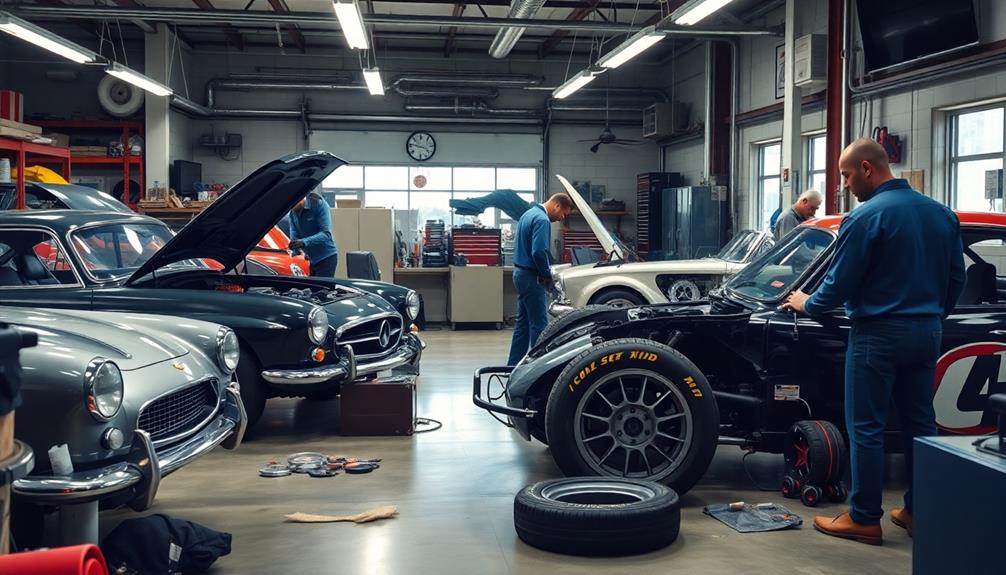
When it comes to automotive repair shops, you'll find a variety of options to choose from, each tailored to specific needs.
Service stations, which date back to the early 1900s, have shifted focus from full-service repairs to primarily selling fuel. This change paved the way for quick lube and express service shops to rise in popularity.
Independent auto repair shops offer a broad range of services, and many technicians who once worked at dealerships now provide specialized services like smog testing in these environments.
If you're looking for something very specific, specialized repair shops are your best bet. These include tire and wheel shops, muffler shops, and auto body shops, each concentrating on particular aspects of vehicle maintenance and repair.
Additionally, the growth of mobile repair services, especially in regions like the UK, reflects a growing consumer demand for convenience.
Whether you choose a traditional auto repair shop or a mobile mechanic, understanding the types of automotive repair services available can help you make informed decisions for your vehicle's needs.
Services Offered by Repair Shops

Automotive repair shops provide a thorough array of services designed to keep your vehicle in top shape. From routine maintenance to vital repairs, these shops guarantee your car runs smoothly and safely. Regular oil changes and tire rotations are essential for vehicle longevity. When you notice engine issues, diagnostic services can pinpoint the problem and maintain efficiency.
Here's a quick overview of services typically offered by an auto repair shop:
| Service Type | Description | Importance |
|---|---|---|
| Routine Maintenance | Oil changes, tire rotations, fluid checks | Enhances vehicle longevity |
| Engine Diagnostics | Identifies engine component issues | Guarantees operational safety |
| Brake Replacement | Replacement of worn brake pads and rotors | Critical for safety |
| Suspension Repair | Maintenance of suspension and steering systems | Affects handling |
| Recall Management | Addresses manufacturer recalls and service needs | Guarantees compliance |
Differences Between Shop Types
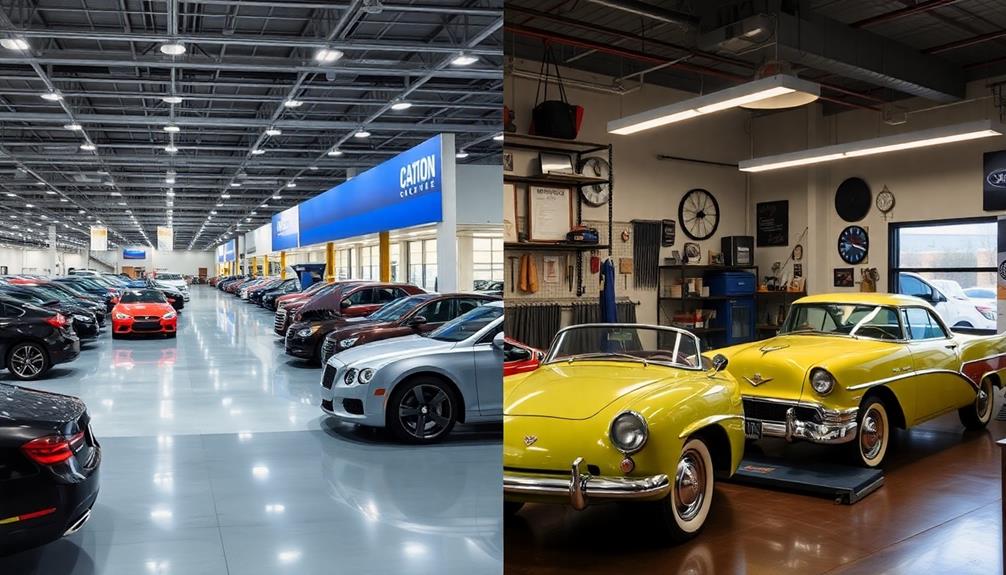
Understanding the variety of automotive repair shop types can help you choose the right service for your vehicle's needs. There are several categories, including service stations, independent repair shops, and specialized shops, each serving unique purposes.
If you're dealing with collision damage or need cosmetic repairs, auto body shops are your go-to. They focus on restoring your vehicle's appearance and structure.
On the other hand, if you have mechanical issues, like engine problems or need routine maintenance, general auto repair shops are designed for that. They offer a broader range of services compared to specialized shops, which might only focus on specific components, like tire or muffler services.
Additionally, the rise of mobile mechanics adds a layer of convenience, allowing for on-site repairs instead of requiring you to bring your vehicle to a traditional shop.
Independent repair shops often provide diverse services, including emission testing, while new car dealerships typically handle warranty repairs and manufacturer-specific services.
Industry Trends and Regulations
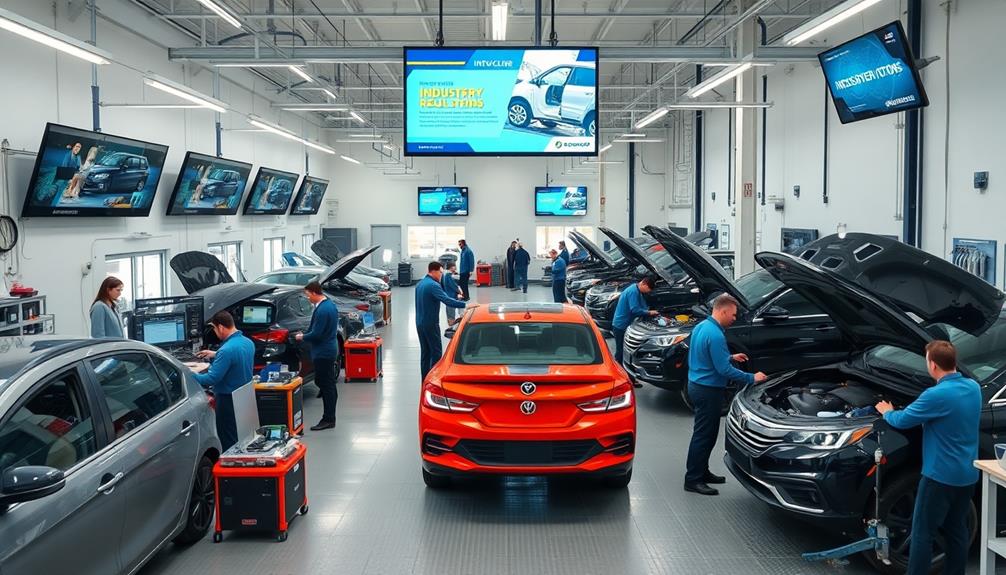
In recent years, the automotive repair industry has experienced significant shifts driven by consumer demands and regulatory changes. You've likely noticed the growing preference for convenience, with mobile repair services gaining traction, especially in the UK. This trend reflects how consumers prioritize accessibility and speed.
Several key trends are shaping the industry today:
- Mobile Repair Services: More shops are offering on-the-go solutions to meet customer needs.
- ASE Certification: Technicians are increasingly required to hold this certification to guarantee quality and specialized service.
- Block Exemption Regulation: This regulation boosts consumer choice, allowing you to select independent repair shops without risking warranty coverage.
- Focus on Preventive Maintenance: Shops are shifting their approach to prioritize preventive care over reactive repairs, enhancing vehicle longevity.
Additionally, the rise of quick lube and express service shops has changed how you view automotive repair, emphasizing efficiency and speed.
As these trends evolve, it's essential to stay informed on how they impact your options and experiences within the automotive repair landscape.
Licensing and Compliance Requirements
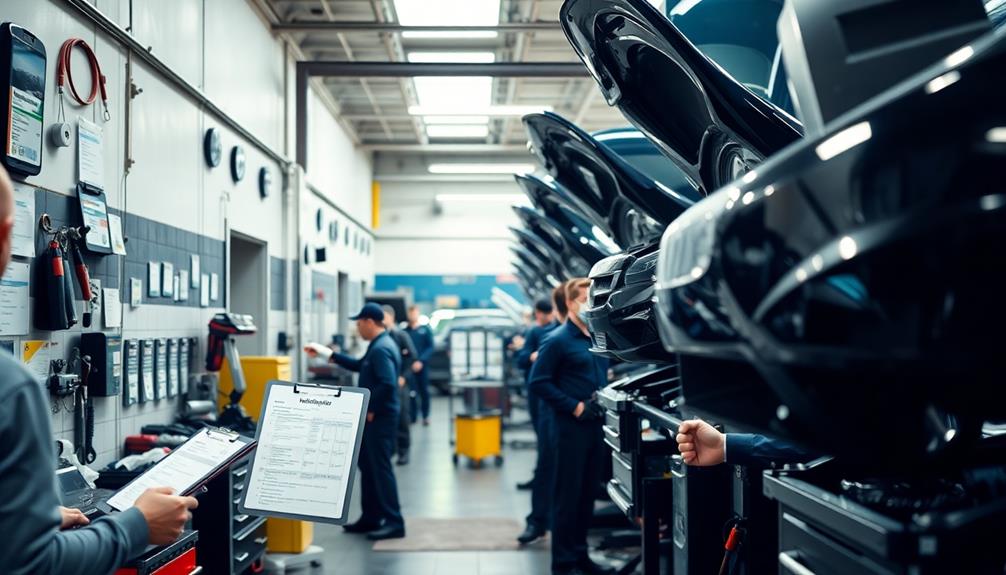
Before opening your automotive repair shop, you need to navigate a series of licensing and compliance requirements that guarantee your business operates legally and efficiently.
First, you'll need to obtain a license to operate, which comes with an initial fee of $569.59 and an annual renewal fee of $546.34. A criminal background check is mandatory for all applicants, so be prepared for that process.
Once you have your application ready, you can submit it in person or by mail. Make sure you include necessary documents like the Certificate of Occupancy and Articles of Incorporation if applicable.
After you receive your license, it's vital to display it prominently on your premises at all times.
Keep in mind that unannounced inspections can occur to verify compliance with regulations. If you fail to renew your license within 30 days after its expiration, you'll have to reapply as a new applicant, which could lead to operational interruptions for your shop.
Staying on top of these licensing and compliance requirements is essential for the smooth running of your automotive repair shop.
Frequently Asked Questions
What Is the Meaning of Auto Repair Shop?
An auto repair shop's meaning revolves around a facility where you can get your vehicle serviced and repaired. They focus on maintaining mechanical systems, offering routine maintenance, diagnostics, and specialized services tailored to your car's needs.
What Does an Auto Shop's Repair Area Include?
In the heart of an auto shop, you've got mechanical repair spaces, diagnostic tools, lifts, and zones for routine maintenance. Each corner hums with activity, ensuring your vehicle runs smoother than a well-oiled machine.
What Is the Difference Between Mechanic and Auto Repair Shop?
A mechanic's a skilled individual who repairs vehicles, while an auto repair shop is the business that houses these mechanics. You'll find various specialists there, ensuring a wider range of services than one mechanic alone offers.
What Is Repairing in Automotive?
Repairing in automotive means fixing mechanical and cosmetic issues in vehicles. You'll handle engine repairs, brake replacements, and routine maintenance. It's all about ensuring your vehicle runs smoothly and safely for your driving needs.
Conclusion
In summary, understanding the various types of automotive repair shops can help you make informed choices when your vehicle needs attention. Did you know that nearly 75% of vehicle owners rely on independent repair shops for their maintenance needs? This statistic highlights the importance of knowing what each shop offers and how they differ. By staying informed, you can guarantee your car gets the best care possible, keeping it running smoothly for years to come.

